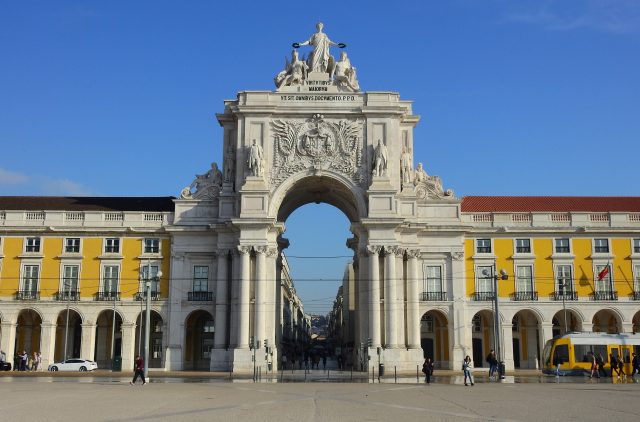
European Diary: Lisbon, September 2021
During the Covid Epidemic, I spent fifteen months grounded in Iceland, almost as if under house arrest, although it must be said that the government measures there were much milder than in many other Western countries. It was therefore quite a relief when I could travel again. One of my first trips abroad after the Epidemic was to Portugal. The Brussels research institute New Direction held a ‘Think Tank Central’ in Lisbon 22–25 September 2021 where representatives from many institutes and associations in Europe and North America discussed how to meet challenges from the Left. The think tanks participating included, besides New Direction, the Austrian Economics Center in Vienna, the Danube Institute in Budapest, the Edmund Burke Foundation in the Hague and Washington DC, the Ayn Rand Institute in Santa Ana, California, Americans for Tax Reform in Washington DC, Centre for Policy Studies in London, CEPOS in Copenhagen, the Institute of Economic Affairs in London, Oikos in Stockholm, the Freedom Association in London, Civismo in Madrid and Disenso, also in Madrid.
Four Reasons for Leftist Gains
In my talk at the conference, I pointed out that the Left has recently made significant gains in the West, especially among young people, despite the total failure of the socialist project. I identified four reasons for this perhaps surprising trend. 1) The common enemy that in the Cold War had united the Right (as a shorthand description of conservatives and classical liberals defending Western civilisation) had suffered an ignominous defeat. Communism had collapsed, not with a bang, but a whimper. 2) With the general acceptance of capitalism the Right has been deprived of its strongest argument against the Left, economic efficiency, brought about by private property and free trade. 3) An ever-larger proportion of voters has become dependent on government for their livelihood, either as public employees or welfare recipients. 4) The Marxists, in various guises, have taken over the media and the schools (following Antonio Gramsci’s strategy), producing a new left-wing generation susceptible to wokeism, ecofundamentalism and other delusions.
I insisted however that the Leftist triumph was not inevitable. The Right need not retreat, and some trends may serve to build up anew or strengthen a common cause. 1) China has started a new cold war which might induce the West to unite. 2) Many of the more fanciful spending programmes of the Left will utterly fail, and be seen to fail. 3) In countries where the Right comes into power, it should try to reduce the number of government employees and welfare recipients, not least because the need for welfare benefits has greatly diminished with increased prosperity. 4) Even if the Right should not try to limit the Left’s freedom of speech, it need not spend taxpayers’ money on its propaganda in the media and schools. 5) First and foremost, I said, the Right has to meet the intellectual challenge from the Left with arguments and evidence for the four principles which define it: private property, free trade, limited government and respect for tradition. In particular, I mentioned the huge global network of active and effective free-market think tanks which have demonstrated time and again that government was more often the problem than the solution.
Thatcher’s Historical Role
I used the opportunity in Lisbon to meet with old friends, including Dr. Barbara Kolm from Austria, Dr. Yaron Brook from the United States, and Robert Tyler from the United Kingdom (now working in Brussels). Some of us had a memorable dinner at the Michelin one-star restaurant Eleven in Lisbon. It serves Mediterranean cuisine, with excellent Portuguese wines, and can be unreservedly recommended. The food is delicious, and it is not as pretentious as many other Michelin restaurants. No less memorable was the insightful speech at the Margaret Thatcher Dinner by John O’Sullivan, one of Thatcher’s assistants as Prime Minister and now Director of the Danube Institute. He emphasised that when she formed her first government in 1979 the triumph of Thatcherism was by no means a foregone conclusion. It took determination and courage to accomplish what she did which was to put the Great back into Britain and to defeat both the Argentinian junta and the extremists in the National Union of Miners. O’Sullivan concluded however that Thatcher’s greatest contribution was that she not only supported ‘vigorous virtues’ like hard work, thriftiness, prudence, diligence, sobriety and self-control, but that she herself incarnated them.
Lisbon in the 11th Century
For me, the trip to Lisbon had a special relevance for an additional reason. In 2005, I had organised in Iceland a meeting of the Mont Pelerin Society, an international academy of scholars and men of affairs trying to define, defend and extend individual freedom. Two of the participants, John Nugeé from England and Gabriel Stein from Sweden, both working as financial analysts in the City of London, became interested in the Icelandic Commonwealth. It had been formed in 930, mainly by Norwegian refugees who did not want to pay taxes to the newly-formed monarchy. The Commonwealth lasted to 1262 and it had no king but the law, as a German chronicler once put it. Nugeé and Stein decided to write a novel about the Icelanders’ yearning for freedom. It was finally published in late 2021, Sailing Free, a lively and well-written work. It is about the two Icelandic brothers Gudmundr and Kari. Gudmundr stays at the family farm and gets entangled in various local affairs, whereas Kari trades abroad and goes all the way to Lisbon where he has some exciting adventures. When Kari returns home, he has to argue for Iceland’s ancient liberties against threats from the Norwegian king, the Roman Church and their Icelandic accomplices. The novel takes place in the 11th century, and here I was in Lisbon, in the 21st century, a thousand years later, still exploring the same questions as Kari the trader—justice, order, and sovereignty.



 Subscribe
Subscribe